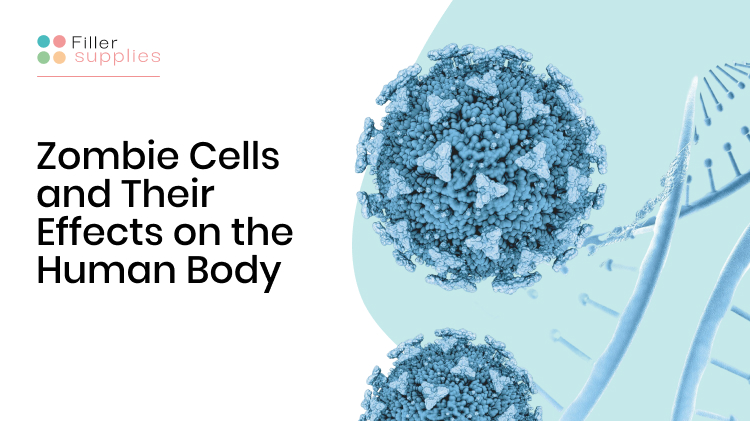Zombie Cells and Their Effects on the Human Body

What do you imagine when you hear the term ‘zombie cells’? We understand if it would be something straight from a horror movie, but everything is much simpler than that. Zombie cells are an actual issue that can cause several health problems and even speed up the aging process. The name originated from the ability of these cells to remain alive despite being damaged; they start releasing harmful chemicals around them, thus damaging healthy cells nearby.
In this article, we will cover this topic in more detail and explain the essentials, so you can better understand the nature of zombie cells.
Zombie Cells Explained: What Should You Know?
Zombie cells (scientifically speaking, senescent cells) are defective or damaged cells that don’t die. Even though they cannot function properly and lose their ability to replicate, they remain alive and active enough to secrete harmful molecules that may lead to complications such as inflammation. This can increase the risk of degenerative diseases and accelerate aging.
According to the aging research, numerous factors can contribute to cell aging or damage. However, when it happens, they always stop multiplying and follow one of these scenarios:
- Apoptosis. It is also known as a natural cell death. It removes harmful cells and helps maintain tissue health. This way, the old cells are replaced with healthier ones. Aptosis also plays a significant role in preventing tumor growth and, eventually, cancer. It also was proven in a wide range of other diseases, from Alzheimer’s disease to metabolic disorders. Zombie cells may affect this process, thus resisting apoptosis;
- Senescence. If the cell reaches this phase, it refuses to die and releases harmful chemicals that may cause cell senescence. It may significantly weaken the immune system, reduce its ability to fight infections, and even worsen one’s chronic diseases. This process may also increase the number of aging cells in the body.
Where Do Zombie Cells Come From?
When we are younger, our bodies successfully battle zombie cells, and in this way, a space is created for new ones. However, aging, age-related diseases, and multiple other factors can contribute to weakening the immune system, making it less effective in removing zombie cells.
The common process in cellular senescence is telomere shortening, also known as replicative senescence. It stands in the way of the cell’s ability to divide or replicate. And when the cell reaches the maximum number of cell divisions, it turns into senescent. The presence of zombie cells in the body may harm a person through:
- Inflammation;
- Tissue dysfunction;
- Weakening the immune system.
Are Zombie Cells (Senescent Cells) Linked to Aging?
According to the National Institute on Aging, the body’s natural ability to clear senescent cells weakens with age. That is why they tend to accumulate more as people age, which can cause potential issues. Younger people rarely face this problem because of their stronger bodies and immune systems, which are well-trained to remove zombie cells.
That’s how senescent cells can contribute to the aging process:
- The exhaustion of the stem cell function. Zombie cells affect nearby cells via inflammatory signaling factors. It may lead to significant harm to impressionable cells, hinder cell growth, communication, and other aspects. According to clinical trials, it contributes to aging and organ dysfunction;
- Inflammation. We’ve already mentioned it briefly, but zombie cells release damaging chemicals, thus poisoning healthy cells nearby. It also affects the skin’s ability to heal and repair itself, which can cause wrinkles and a loss of skin elasticity. That’s when people start noticing the increase in aging signs and start considering treatment options, such as dermal fillers. However, this step must always be discussed with a medical professional to ensure its safety.
Interesting to know: According to the studies, when the senescent brain cells were swept away in mice, the outwards signs of their dimatia disappeared.
What Can Help Target Cellular Senescence Naturally?
In order to avoid potential problems, it is essential to keep up with a healthy lifestyle and implement certain habits into one’s daily routine to ensure the body remains healthy and youthful. Here are a few recommendations that can be followed for a more successful battle with zombie cells:
Exercise. Of course, it has plenty of benefits on its own, including the reduction of fat tissue; however, it’s also proven to increase autophagy, a process that allows the body to eliminate old, damaged cells and regenerate new ones instead. It is perfect for better cell repair and maintenance;
- Calorie restriction. Consuming fewer calories than the body requires can be a method of reducing the number of senescent cells. It’s said that this option triggers cell death, especially the ones that are damaged or dysfunctional;
- Fasting. This can also trigger autophagy, thus helping the body clear out damaged cells. Intermittent fasting can also delay the senescence of the cells. It is still not proven how long people should fast to stimulate this process properly, but studies on animals claim it should be something between 24 and 48 hours;
- A healthy diet. To target senescent cells, individuals must incorporate a healthy diet into their routine. Consume more fruits, vegetables, and whole grains to limit the number of senescent cells. Antioxidant-rich foods help fight free radicals, as well as lead to slower aging.
To Sum Up
Even though the term ‘zombie cells’ may sound threatening, it is a part of the body functioning that can be taken under control with the help of timely adjustments in one’s daily routine. In case there are any concerns, it is always a good idea to schedule regular check-ups with your doctor to ensure everything is working as it should. We also recommend consulting a professional to obtain more information specific to one’s individual case.
